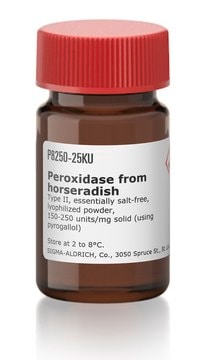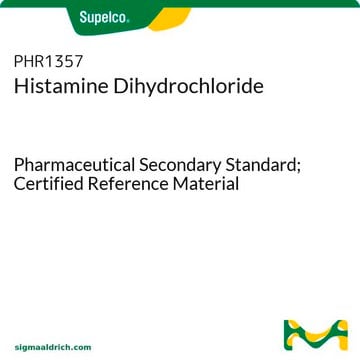D7876
Diamine Oxidase from porcine kidney
≥0.05 unit/mg solid
Sinónimos:
Amine:oxygen oxidoreductase (deaminating) (pyridoxal-containing)
About This Item
Productos recomendados
biological source
Porcine kidney
Quality Level
form
solid
specific activity
≥0.05 unit/mg solid
mol wt
170 kDa
solubility
100 mM sodium phosphate buffer, pH 7.2: soluble 10 mg/mL
foreign activity
monoamine oxidase (benzylamine substrate) ≤1%
storage temp.
−20°C
General description
Application
Biochem/physiol Actions
Unit Definition
Storage Class
11 - Combustible Solids
wgk_germany
WGK 3
flash_point_f
Not applicable
flash_point_c
Not applicable
ppe
Eyeshields, Gloves, type N95 (US)
Certificados de análisis (COA)
Busque Certificados de análisis (COA) introduciendo el número de lote del producto. Los números de lote se encuentran en la etiqueta del producto después de las palabras «Lot» o «Batch»
¿Ya tiene este producto?
Encuentre la documentación para los productos que ha comprado recientemente en la Biblioteca de documentos.
Los clientes también vieron
Protocolos
To standardize a procedure for the enzymatic assay of Diamine Oxidase.
Nuestro equipo de científicos tiene experiencia en todas las áreas de investigación: Ciencias de la vida, Ciencia de los materiales, Síntesis química, Cromatografía, Analítica y muchas otras.
Póngase en contacto con el Servicio técnico











